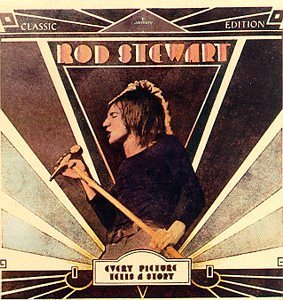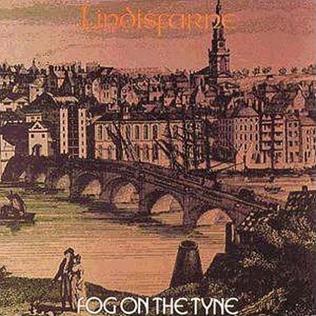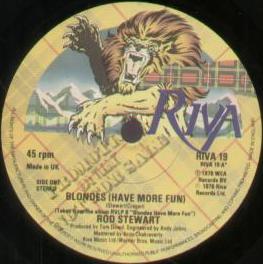
Sir Roderick David Stewart is a British rock and pop singer and songwriter. Born and raised in London, he is of Scottish and English ancestry. With his distinctive raspy singing voice, Stewart is among the best-selling music artists of all time, having sold more than 120 million records worldwide. He has had 10 number-one albums and 31 top-ten singles in the UK, six of which reached number one. Stewart has had 16 top-ten singles in the US, with four reaching number one on the Billboard Hot 100. He was knighted in the 2016 Birthday Honours for services to music and charity.

Every Picture Tells a Story is the third studio album by Rod Stewart. It was released on 28 May 1971. It incorporates hard rock, folk, and blues styles. It went to number one on both the UK and US charts and finished third in the Jazz & Pop critics' poll for best album of 1971. It has been an enduring critical success, including a number 172 ranking on Rolling Stone's 2003 list of the 500 greatest albums of all time.

"Maggie May" is a song co-written by singer Rod Stewart and Martin Quittenton, and performed by Rod Stewart on his album Every Picture Tells a Story, released in 1971.
"(I Know) I'm Losing You" is a 1966 hit single recorded by the Temptations for the Gordy (Motown) label, written by Cornelius Grant, Eddie Holland and Norman Whitfield, and produced by Norman Whitfield.

The Story So Far: The Very Best of Rod Stewart is Rod Stewart's career-retrospective compilation album released in 2001. The album summarises his solo work beginning with material from his 1971 breakthrough album Every Picture Tells a Story until his 2001 album Human. For contractual reasons, only two songs from his Mercury Records tenure were included. The rest of the material is from different albums released under Warner Bros. Records.

It Ain't Easy is a 1971 album by Long John Baldry. It marked his return to the edgier blues sound that he performed in the mid-60s. It was Baldry's fifth solo album.

Never a Dull Moment is the fourth studio album by rock musician Rod Stewart. It was released on 21 July 1972; that year it became a UK number-one album and reached number two on the US Album chart. The track "You Wear It Well", co-written by Stewart and classical guitarist Martin Quittenton, was a smash hit, as well as "Twisting the Night Away", a song originally recorded by Sam Cooke.

Smiler is the fifth studio album by English rock singer-songwriter Rod Stewart. It was released on 4 October 1974 by Mercury Records. It reached number 1 in the UK album chart, and number 13 in the US. The album included covers of Chuck Berry, Sam Cooke and Bob Dylan songs, as well as a duet with Elton John of John's song "Let Me Be Your Car". Stewart also covered Carole King's "(You Make Me Feel Like) A Natural Woman" where 'Woman' is switched to 'Man'. This track was selected for special derision by critics. The release of the album itself was held up for five months due to legal problems between Mercury Records and Warner Bros. Records.

Fog on the Tyne is a 1971 album by English rock band Lindisfarne. Bob Johnston produced the album, which was recorded at Trident Studios in Soho, London, in the mid-1971 and released in October that year on Charisma Records in the United Kingdom and Elektra Records in the U.S..

"You Wear It Well" is a song written by Rod Stewart and Martin Quittenton, performed by Stewart. It uses an arrangement markedly similar to that of "Maggie May", one of Stewart's hits from the previous year.
"Farewell" is a song written by Martin Quittenton and Rod Stewart. Stewart released it on his 1974 album Smiler. Among the musicians featured were Ray Jackson of Lindisfarne on mandolin, and Ric Grech on violin.

"Ain't Love a Bitch" is a song written by Gary Grainger and Rod Stewart. Stewart released it on his 1978 album Blondes Have More Fun, and it was one of four songs on the album co-written by Stewart and Grainger. The song was released as a single in 1979, reaching #11 on the UK charts, and #22 on the Billboard Hot 100 chart in the United States. It spent 8 weeks on the UK charts and 6 weeks on the US charts. The song also reached the Top Ten in several countries, including Ireland. Billboard magazine placed Stewart #7 on its list of the Top Single Artists of 1979 on the strength of "Ain't Love a Bitch" and its predecessor, "Da Ya Think I'm Sexy?".

Sing It Again Rod is the first compilation album by Rod Stewart released in 1973. The album is notable for its Peter Corriston-designed die-cut album sleeve.

The Best of Rod Stewart is a compilation album released by Rod Stewart in 1976. It was released by Mercury Records to complete Rod’s contract before switching labels to Warner Bros. and moving to The United States. It includes tracks from all his Mercury albums and some non-album singles from the same time period.

The Best of Rod Stewart Vol. 2 is a compilation album released by Rod Stewart in 1977. It was released by Mercury Records as part of Stewart's contract before switching labels to Warner Bros. and moving to The United States. It includes tracks from all five of his Mercury albums.

Unplugged...and Seated is a live album released by British musician Rod Stewart on 24 May 1993 by Warner Bros. Records. It is Stewart's second live album and his first appearance on MTV Unplugged. The unplugged versions of "Have I Told You Lately" by Van Morrison, "Reason to Believe", "Having a Party", and "People Get Ready" were released as singles, with "Have I Told You Lately" and "Having a Party" reaching success as singles. A special collector's edition was released in March 2009 on Rhino Records. This two-disc package included the DVD of the performance with 13 songs while the CD contained 17 tracks including two songs not on the original 1993 release.
Lindsay Raymond "Ray" Jackson is an English mandolin and harmonica player. He was a member and also joint lead vocalist, with Alan Hull, of the folk-rock group Lindisfarne from their original formation in 1970 until his departure in 1990. The group's drummer Ray Laidlaw shared the same forename, and thus Jackson was generally known in the group as "Jacka".
Martin Quittenton was a British guitarist and composer. He played in the blues rock band Steamhammer, formed in 1968. Their debut album Steamhammer was released in 1969.

"Every Picture Tells a Story" is a song written by Rod Stewart and Ronnie Wood and initially released as the title track of Stewart's 1971 album Every Picture Tells a Story. It has since become one of Stewart's signature songs and released on numerous Stewart compilation and live albums, including The Best of Rod Stewart, Storyteller – The Complete Anthology: 1964–1990 and Unplugged...and Seated. It was released as a single in Spain, Portugal and Japan, backed with "Reason to Believe". It has also been covered by the Georgia Satellites on their 1986 album Georgia Satellites and by Robin McAuley on Forever Mod: A Tribute to Rod Stewart.

"Blondes (Have More Fun)" is a song written by Rod Stewart and Jim Cregan that was originally released as the title track of Stewart's 1978 album Blondes Have More Fun. In some countries it was released as the third single off the album, following "Da Ya Think I'm Sexy?" and "Ain't Love a Bitch". It only reached the Top 70 in the UK, topping out at #63 but reached #23 in Ireland. The song was covered by Vince Neil on the Japanese version of his album Exposed.
















